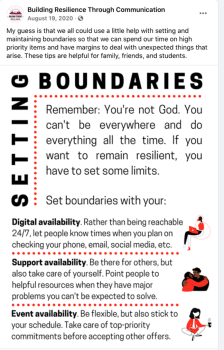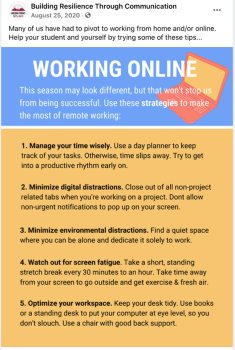Boundaries To remain resilient, set limits
Setting Boundaries
by Lesa Stern, Ph.D., Professor of Communication Studies

In this age of information overload and multiple and competing demands on our time, we can work on being good role models for our students by prayerfully setting and maintaining healthy boundaries regarding work, family and friends, recreation, spiritual practices, and sleep. Prayerfully consider what God is calling you to this day, week and season, and then set your schedule. If you have ever read Hummel’s pamphlet, “The Tyranny of the Urgent” (1967), you know that urgent things may not be high-priority items, and they can eat up our time and distract us from important things. Discerning which of these unexpected things actually come from God and which are merely distractions can be difficult. Seeking the Spirit’s guidance though prayer is essential.

Discerning the important is also challenging. Our students often suffer from FOMO—the fear of missing out—and perhaps you do, too. Selecting the activities you value most and NOT doing everything will help you live a life with margins and peace. Yes, we’ll miss out on some things, but more importantly, we’ll be spending more time on high-value things and create the mental and emotional space to enjoy these activities rather than rushing through them to get to the next thing to check off. Setting boundaries around fewer and higher priority items can help both you and your students. Build in work, play, God and rest times.
God bless you in this endeavor!
Many of us working from home find it difficult to set boundaries, as our home and work life have blended. Spending more focused time during work or school will enable us to make more time for our family, friends, God, recreation and sleep. Brain research shows that multitasking is not the best way to learn or work. Minimizing distractions will help you keep your focus and allow you to complete your tasks more efficiently and effectively.